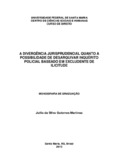| dc.contributor.advisor | Oliveira, Rafael Santos de | |
| dc.creator | Martinez, Jullia da Silva Guterres | |
| dc.date.accessioned | 2017-08-21T16:59:53Z | |
| dc.date.available | 2017-08-21T16:59:53Z | |
| dc.date.issued | 2015-12-01 | |
| dc.date.submitted | 2015 | |
| dc.identifier.uri | http://repositorio.ufsm.br/handle/1/11452 | |
| dc.description | Trabalho de conclusão de curso (graduação) - Universidade Federal de Santa Maria, Centro de Ciências Sociais e Humanas, Curso de Direito, RS, 2015. | por |
| dc.description.abstract | The archiving of police inquest is an administrative step made when present special impeditive conditions to the filing of penal action (like circumstances that exclude the illegality), or when does not have enough elements for the accusation. However, if after the authorizing decision of the archiving arise new proofs that are capable of moving the criminal prosecution again, and even allow the filing of the major criminal lawsuit, appear the issue of the possibility of unarchive the police inquest. Specifically, the controversy of this question focuses on cases when the archiving was based in the presence of some circumstance that exclude the illegality, what makes different opinions in the doctrine and in the case law. So, based on this, it was structured this research, which used legal, doctrinaire and jurisprudential foundation, analyzing the differences on the subject. Furthermore, was used the dialectical method because the object of this research was treated from their contradiction, in other words, it was verified the various positions adopted as regards the ability to unarchive police investigation based on legal excuse, as well as the effects of the decision in such cases. So, initially it was presented the institution of police investigation to then discuss the archiving and specify their reasons. After that, it was analyzed the res judicata arising from the decision to archive and, consequently, if there is a possibility of reopening if new evidence be discovered. Finally, there was an analysis of the decisions handed down by the Supreme Court and the Superior Court of Justice on the subject in order to see how the issue has been effectively resolved by the higher courts. It was concluded that depending on the adopt position, there are different legal consequences, which is a serious harm for the legal certainty, since through the most recent decisions by the Supreme Court, the issue became even more controversial, creating two different positions. Therefore, this issue should be immediately decided in an effective and definitive manner so as not to generate a greater sense of impunity to the population and uncertainty to the investigated person. | eng |
| dc.language | por | por |
| dc.publisher | Universidade Federal de Santa Maria | por |
| dc.rights | Acesso Aberto | por |
| dc.subject | Inquérito policial | por |
| dc.subject | Arquivamento | por |
| dc.subject | Coisa julgada | por |
| dc.subject | Possibilidade de desarquivamento | por |
| dc.subject | Police inquest | eng |
| dc.subject | Archiving | eng |
| dc.subject | Res judicata | eng |
| dc.subject | Possibility of unarchive | eng |
| dc.title | A divergência jurisprudencial quanto a possibilidade de desarquivar inquérito policial baseado em excludente de ilicitude | por |
| dc.title.alternative | The jurisprudential disagreement as to possibility of unarchive police inquest based on illegality excludent | eng |
| dc.type | Trabalho de Conclusão de Curso de Graduação | por |
| dc.degree.local | Santa Maria, RS, Brasil. | por |
| dc.degree.graduation | Direito | por |
| dc.description.resumo | O arquivamento do inquérito policial é uma medida administrativa adotada quando
há condições especiais impeditivas ao ajuizamento da ação penal (como a presença
de excludente de ilicitude, por exemplo), ou então quando não há elementos
suficientes para o oferecimento da denúncia. Entretanto, se após a decisão judicial
autorizando o arquivamento, houver o surgimento de novas provas, estas capazes
de movimentar novamente a persecução penal, e até mesmo autorizar o
ajuizamento da ação penal, surge a questão quanto a possibilidade de
desarquivamento dos autos inquisitoriais. Especificamente, a controvérsia de tal
tema foca-se nos casos em que o arquivamento foi baseado na presença de
excludente de ilicitude, o que acaba acarretando opiniões divergentes na doutrina e
na jurisprudência. Desta forma, com base nisso foi estruturada a presente pesquisa,
a qual utilizou-se de embasamento jurídico, doutrinário e jurisprudencial, analisandose
as divergências a respeito do tema. Além disso, foi feito uso do método dialético,
visto que o objeto da pesquisa foi abordado a partir de suas contradições, ou seja,
foi verificada as diversas posições adotadas quanto a possibilidade de desarquivar
inquérito policial arquivado com base em excludente de ilicitude, bem como aos
efeitos da decisão de arquivamento em tais casos. Assim, inicialmente apresentouse
o próprio instituto do inquérito policial, para então adentrar no arquivamento
daquele e especificar seus motivos ensejadores. Após, analisou-se a coisa julgada
decorrente da decisão judicial que determina o arquivamento e, consequentemente,
se há possibilidade de desarquivamento em caso de novas provas serem
descobertas. Por fim, realizou-se uma análise das decisões proferidas pelo Supremo
Tribunal Federal e pelo Superior Tribunal de Justiça acerca do tema, de forma a
verificar como a questão vem sendo efetivamente resolvida pelos tribunais
superiores. Foi concluído que dependendo da posição adotada, há diferentes
consequências jurídicas, o que representa um grave prejuízo à segurança jurídica,
visto que através das mais recentes decisões emitidas pela Suprema Corte, o tema
tornou-se ainda mais controverso, perfectibilizando duas posições extremamente
opostas. Portanto, tal questão deverá ser prontamente decidida de forma efetiva e
definitiva para que não gere um maior sentimento de impunidade à população e de
incerteza ao indivíduo investigado. | por |
| dc.publisher.country | Brasil | por |
| dc.publisher.initials | UFSM | por |
| dc.subject.cnpq | CNPQ::CIENCIAS SOCIAIS APLICADAS::DIREITO | por |
| dc.publisher.unidade | Centro de Ciências Sociais e Humanas | por |


